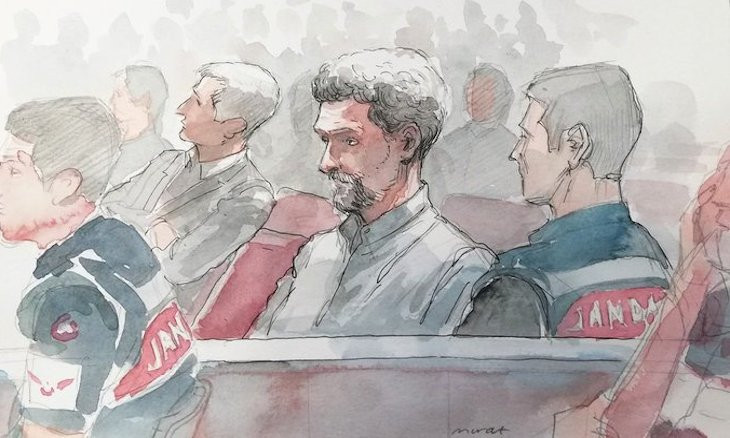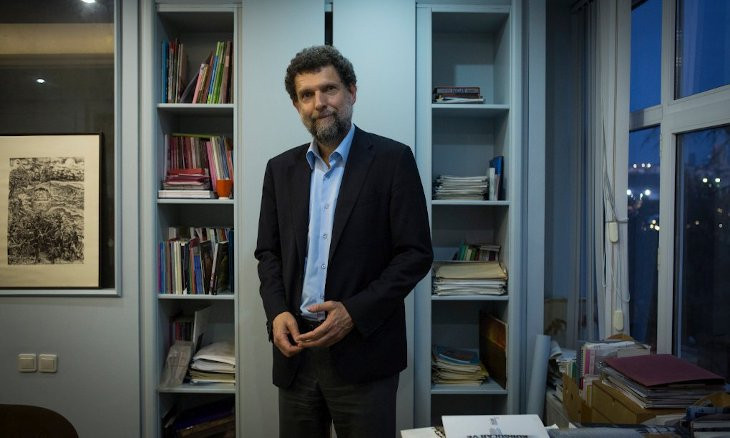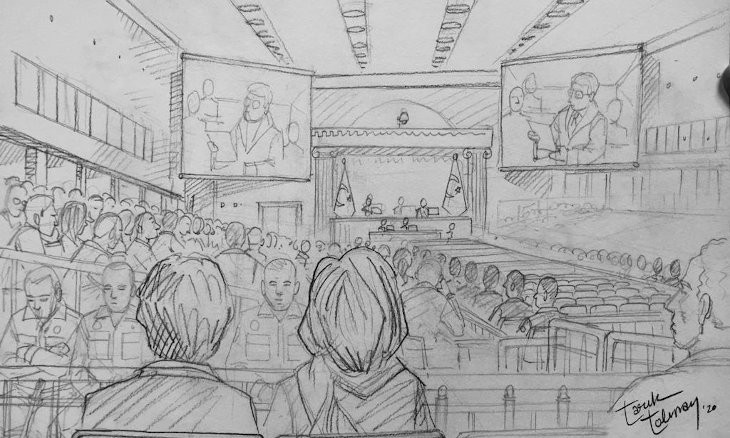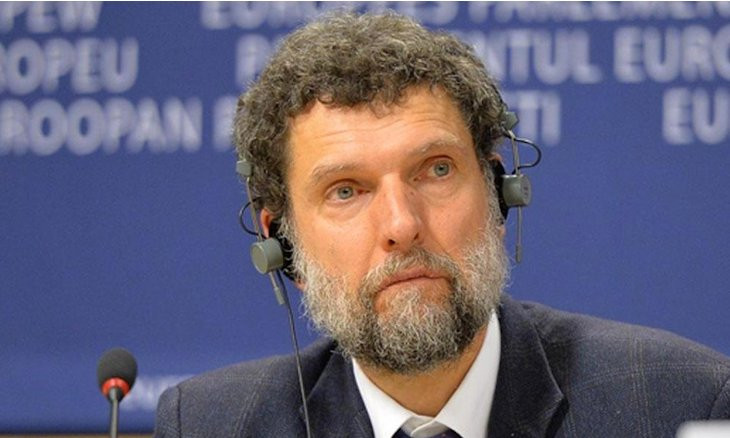Amnesty International urges freedom for Osman Kavala, rights defenders in Gezi case
Amnesty International has called for the freedom of prominent philanthropist, human rights activist and businessman Osman Kavala and other rights defenders who are being tried over the 2013 Gezi Park protests. "We see this case as an attempt to destroy the independent civil society. It's a completely political case," Andrew Gardner, Amnesty International’s Turkey Strategy and Research Manager, told Duvar English.
Neşe İdil / Duvar English
Amnesty International has called for the freedom of Osman Kavala and other rights defenders who are being tried over the 2013 Gezi Park protests, saying that civil society is being tried to be suppressed by the government.
"We see this case as an attempt to destroy the independent civil society," Andrew Gardner, Amnesty International’s Turkey Strategy and Research Manager, told Duvar English on Feb. 17, a day before the final hearing of the case.
 Osman Kavala to remain in jail despite European rights court release call
Osman Kavala to remain in jail despite European rights court release callProminent philanthropist, human rights activist and businessman Kavala and 15 others are being tried in the case into the Gezi Park protests, which took place in Istanbul’s Taksim following harsh government response to a group of protesters trying to prevent the cutting down of trees for a large development project planned by the government.
Kavala, who is accused of being one of the "managers and organizers" of the protests, was arrested in November 2017 on suspicion of attempting to overthrow the government and the constitutional order through force and violence.
The European Court of Human Rights (ECHR) ruled on Dec. 10, 2019 that Turkey violated Kavala’s rights, citing the violation of Article 18 of the European Convention on Human Rights, finding that his imprisonment involves a restriction on rights for an improper purpose, while also calling for his immediate release.
Despite the ECHR ruling, Kavala was not released by the 30th Heavy Penal Court and remains in prison.
 Europe's top rights court rules Turkey violated Osman Kavala's rights
Europe's top rights court rules Turkey violated Osman Kavala's rights"The ECHR ruled for Kavala's release and reached the conclusion that this imprisonment process and his trial aim to silence him and intimidate civil society," Milena Buyum, Amnesty International’s Turkey Campaigner, told Duvar English, adding that Turkey must abide by the ECHR ruling.
"The ECHR ruling shows that this case has no legal basis. The violation of Article 18 is very serious. Taking into account that Kavala's arrest has no legal basis, these horrendous sentences sought by the prosecutor also has none," she said, adding that the 30th Heavy Penal Court's decision to not release Kavala shows the efforts to punish him immediately.
"This shows the grave situation that the civil society and human rights defenders are in," Buyum noted.
One of the arguments put forward by the court in not releasing Kavala was that the ECHR ruling was "not final" and that its official translation was not sent by the Justice Ministry.
 Court rules to keep Osman Kavala in jail
Court rules to keep Osman Kavala in jailAccording to Buyum, these arguments are not valid.
"The court should be independent. The case in the ECHR is between the government and Kavala. Technically, the 30th Heavy Penal Court is independent of the government, so it should have abided by the ECHR ruling. An independent court should apply the rulings of an international court in accordance with the constitution," she said.
"The court, instead, asks the government whether it will object to the ECHR ruling. It protects a ministry of this government," Buyum added.
On Feb. 6, Istanbul Chief Public Prosecutor's Office announced its final opinion, seeking aggravated life sentences for Kavala, who is the only one in jail, Mücella Yapıcı and Yiğit Aksakoğlu, who was arrested in November 2018 and was freed on June 25, 2019 on probation, over "attempting to overthrow the government."
 Prosecutor seeks life sentences for three Gezi Park defendants in final legal opinion
Prosecutor seeks life sentences for three Gezi Park defendants in final legal opinionBetween 15 and 20 years in jail is sought for six others, Çiğdem Mater Utku, Ali Hakan Altınay, Mine Özerden, Şerafettin Can Atalay, Tayfun Kahraman and Yiğit Ali Ekmekçi, over "aiding attempted overthrow of the government."
Buyum said that the final opinion was solely based on the indictment and did not take any of the defense statements into account.
"The prosecutor simply repeated allegations made in the indictment," she said.
Saying that attending meetings, having conversations about the events in the country and phone conversations are cited as evidence in the case, Buyum noted that Kavala's phone conversations with the people working for Anadolu Kültür, a non-profit organization, which, according to prosecutors, was used by Kavala to finance and organize Gezi Park protests, were also cited as evidence for "conspiring."
 Jailed philanthropist says his right to fair trial violated
Jailed philanthropist says his right to fair trial violated"The fact that he spoke to others on a few occasions doesn't mean that they were conspiring together. Just because a number of the defendants were abroad at the same time cannot be evidence that they were conspiring together to overthrow the government of Turkey," Buyum said.
"There's complete disconnect between the allegations, the individuals and the so-called evidence presented. It's a shockingly unfair trial and that has been the case since day one," she added.
Both Buyum and Gardner pointed to the fact that the hearing of the Büyükada case, another case that human rights defenders are being tried on charges of "terrorism," is set to be held this week.
"The outcomes of these two cases will show us whether this grave situation of the judiciary that we've been facing for the past four years will continue," Buyum said.
 European Parliament delegation to visit Turkey for Osman Kavala case
European Parliament delegation to visit Turkey for Osman Kavala case"It's tragicomic that we are discussing whether human rights defenders will be freed or not, because both the Gezi and Büyükada trials began without evidence," Gardner said.
Gardner and Buyum stressed that Amnesty International will continue to raise its voice, while also calling for the international community to raise its voice.
"Since these cases are those that individuals are tried, detained and arrested for defending human rights, they are crucial for us," Gardner said.
"There's nothing more legitimate than thinking, contributing to the civil society and working towards making our society one that respects the law and human rights and these cases, which attempt to criminalize the said activities, should never have opened," Buyum said.
According to Gardner, it's hard to predict the outcome of the trial.
"It's nearly impossible to predict the outcome because the case is completely political," he said.
